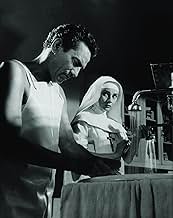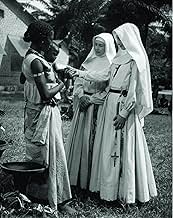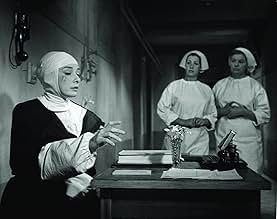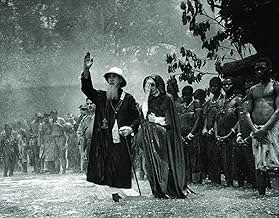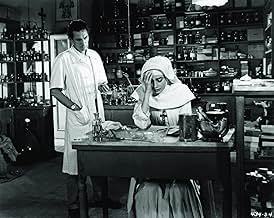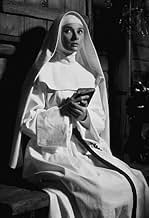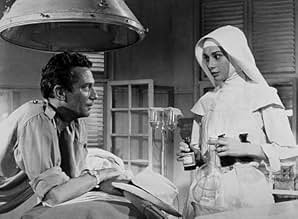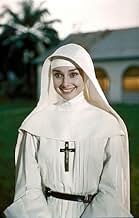La hermana Luke deja a una rica familia en Bélgica para convertirse en monja, y encuentra que su compromiso para con sus votos es un verdadero reto durante la crisis y desasosiego de la segu... Leer todoLa hermana Luke deja a una rica familia en Bélgica para convertirse en monja, y encuentra que su compromiso para con sus votos es un verdadero reto durante la crisis y desasosiego de la segunda guerra mundial.La hermana Luke deja a una rica familia en Bélgica para convertirse en monja, y encuentra que su compromiso para con sus votos es un verdadero reto durante la crisis y desasosiego de la segunda guerra mundial.
- Dirección
- Guión
- Reparto principal
- Nominado para 8 premios Óscar
- 11 premios y 23 nominaciones en total
- Rev. Mother Emmanuel (Belgium)
- (as Dame Edith Evans)
- Mother Mathilde (Africa)
- (as Dame Peggy Ashcroft)
Reseñas destacadas
anyone who thinks she was only a fashion model is well advised to see this film. I first saw it in a theatre, in 1959. I went in about five minutes before the end--and the theatre was completely sold out. At the end of the movie, no one moved--everyone remained seated for about thirty seconds. Then the audience got up and filed out--without a single sound. I stayed through to see the ending again. The audience behavior was the same. I have never seen an audience reaction like this.
Hepburn should have received an Oscar for this performance, as well as another for "Two for the Road," for which she wasn't even nominated. She has been sadly underrated and undervalued as an actress. Her high placement in many Best Actress Ever polls has been entirely justified and very pleasing.
Audrey Hepburn is Gabrielle van der Mal, a young Belgian woman who commits her life to Christ and becomes Sister Luke. Hepburn was proud of this film and justifiably so. Her portrayal (based on a true story) is riveting and authentic. The entire cast is excellent. Peter Finch plays Dr. Fortunati, a physician who challenges Sister Luke with his outspoken nature and his disregard for convention.
The narrative goes well beyond Sister Luke's struggle with her vows of poverty, chastity and obedience. It is a coming of age story and a celebration of self-actualization. In the end, the viewer is left wanting more. Hepburn extracts the maximum emotional impact from each scene, and we know there is much more to this story beyond the final, haunting shot.
In the eyes of her father, Dr Van Der Mal (Dean Jagger), our protagonist - young Gabrielle (Audrey Hepburn) is not really a strong willed girl obedient to the bells. Perhaps he sees other future for her. However, she makes up her mind to resign from engagement with one Jean and sacrifice her life for interior and exterior silence, for the detachment of worldly goods, for obedience and penance doing good and disappearing for the sake of the Kingdom of God. Although she manages to go through the agonies of various inner struggles and tests, will she be able to exercise and bring into action the spirit of charity for all, to face Christianity's hardest obedience - forgive everyone, all evil-doers for anything harmful done to them or their beloved ones?
The truest merit of Fred Zinneman's movie, at first sight, seems to lie in the execution of the storyline (the film's literary source is the book by Kathryn Hulme). It is, as the title implies, a nun's story not so much supplied with laughable aspects (as it is the case with a number of movies nowadays) but a very insightful, thought provoking depiction of virtues enforced and exercised behind the 'bars' of the convent. With this in mind, we deservedly prepare for an excellent glimpse of the atmospheric mystique, for prayers, hymns clothed in unearthly tunes of sublime music. Here, great credit goes not only to the cinematographer Franz Planer, a winner at Academy Awards, who supplies us with cinematographic pearls, including the tremendously effective shots of interior silence of the specific place, but also to Franz Waxman for his brilliantly atmospheric, accurate and vibrant music score. He memorably incorporates certain tunes derived from almost 'iconic' chants to particular scenes. In this way, the score sets the right tone for the story, changes and controls the moods of various scenes. That refers to such pieces of music as 'Salve Regina' and 'Veni Creator Spiritus' - milestones of Christian music.
However, the greatest praise is not deservedly directed towards the crew members, even to the director Fred Zinneman but to Audrey Hepburn in the lead. It seems quite obvious that not every actress can play a nun convincingly. Simply because we, as viewers with certain background experiences (both visual and conceptual), are heavily influenced by certain expectations, even clichéd expectations. In that respect, Ms Hepburn really meets our expectations...more to say, she makes for a perfect portrayal of a nun. There is a combination of certainty and doubt, subtlety and strictness in her face and her entire portrayal, which makes her character easily empathized with. Because the gist that lies behind the fact who Gabrielle/Sister Lukas really is appears to be underlined in her struggles to learn obedience and humility. These virtues that are so memorably and timelessly revealed in Culpa and Penance evoke in her performance. Ms Hepburn portrays a very human character, a very gentle young girl, a subtle nun and a dedicated nurse. Simply a superb performance! A sophisticated portrayal! She is funny at times (mind you the lovely scene with little Felix) and genuinely dramatic when the moment requires that perfectly switching from one bunch of emotions to another. If I were to name her best scenes, I think that task would be quite impossible. I would highlight some of her most memorable scenes, which include the entrance to the convent, the Congo sequence, her collaboration with Dr Fortunati (Peter Finch) vs. the scenes with her father.
The aforementioned Congo sequence belongs to the true pearls among the color films of the late 1950s. Authentic, beautiful shots of nature and landscape, the gloomy scene on the isle of the lepers along with the haunting score long lasts in the memory of a viewer. The film is worth viewing, apart from Ms Hepburn masterful achievement, for the sequence alone.
The supporting cast include some solid performances from Peter Finch as choleric but caring Dr Fortunati, Dean Jagger as wonderful Dr Von Der Mal, Gabrielle's father (what a brilliant father that is who says: "I don't want to be proud of you; I want you to be happy!") and the sisters are uniquely memorable (you will never mix the characters due to their specific features underlined): Peggy Ashcroft as Mother Mathilde, Edith Evans as Mother Emmanuel, Rosalie Crutchley (note Acte from QUO VADIS) as Sister Eleanor. They are recognizable.
Finally, let me quote Bosley Crowther, the New York Times reviewer, who said about the film: "Mr. Zinnemann has made this off-beat drama describe a parabola of spiritual afflatus and deflation that ends in a strange sort of defeat. For the evident point of this experience is that a woman gains but also loses her soul, spends and exhausts her devotion to an ideal she finds she cannot hold."
But what is superior in one's life? Blind obedience to an ideal or being true to oneself? Where are we in that dilemma? Where is our protagonist? What does the final drama indicate? Greater torments or relief? She turns right as she leaves so perhaps...
Dare accuse yourself of seeing it critically but let yourself see it and think. Although the movie is more than half a century old, it has not lost its charm and entertainment along with all the dilemmas herein incorporated. Worth viewing as not only a nun's story but a person's drama.
Director Fred Zinneman struck a correct balance of fine pace and sensitivity in the mesmerizing tale of a young Belgian girl who becomes a religious missionary and is sent to the Belgian Congo to work at a hospital . Finely starred by a luminous Audrey Hepburn as a dedicated nun who subsequently comes to question her vocation , as she is struggling to reconcile her free spirit and philanthropic wishes with the religious rigors ; Hepburn chalked up another hit in this long but always interesting flick based on Kathryn Hulme's novel , being rightly adapted by screenwriter Robert Anderson . Spectacular settings and well staged scenes , in fact , members of the Rome Opera ballet corps were hired to play some of the nuns, and complex convent rituals were literally choreographed for them . This agreeable flick packs an exciting screenplay , thought-provoking drama , fine interpretations and intelligent filmmaking . It's surprising that the movie didn't achieve any of the six Academy Award for which it was nominated ; however , it won NY Film Critics to best actress and director and British Academy gave prizes to best actress and support cast . Casting is frankly well . Good acting by Audrey Hepburn as a beautiful missionary nurse who gains the trust of the locals , not only providing medical care but dealing with African people ; this was one of Audrey Hepburn's favorite of her films and it was also one of her most financially successful . Excellent Peter Finch as a good surgeon , he doesn't quite hit it off with Gabriella at first but soon starts to develop deep affections for her . Furthermore , a nice support cast formed by notorious secondaries such as Edith Evans , Peggy Ashcroft , Dean Jagger ,Beatrice Straight ,Rosalie Crutchley , Ruth White , Barbara O'Neil , Lionel Jeffries , Colleen Dewhurst and Niall MacGinnis , among others . ¨Nun's story¨ consolidated a sub-genre about nuns or religious people in far countries , going on ¨Heaven knows , Mr Allison¨ by John Huston with Robert Mitchum Deborah Kerr , ¨The Sins of Rachel Cade¨ also produced by Henry Blanke and directed by Gordon Douglas with Angie Dickinson , Roger Moore and Peter Finch , too , and ¨A Nun at the Crossroads¨ with Rosanna Schiaffino and John Richardson , among others.
Appropriate as well as sensitive musical score by the classic Franz Waxman . Glamorous and evocative cinematography by Franz Planer , though mostly filmed on real African exteriors , in fact , the film was shot on location in Rome, Bruges, Stanleyville and a real leper colony in the Congo . The motion picture well produced by Henry Blanke was stunningly directed by Fred Zinneman. This is one of various and pleasant works , some major and minor successes of his long career as a filmmaker . He was a Hollywood veteran director, directing early movies and a long career until the 80s . With ¨The nun's story¨ Zinnemann chalked another major hit in this overlong but always absorbing tale . After acquiring the rights to Kathryn Hulme's bestselling novel, Fred Zinnemann found that no one in Hollywood had any enthusiasm towards turning it into a film, citing it as being devoid of action , but all that changed when Audrey Hepburn expressed a desire to take the lead role . Rating : 8 , Above average , well worth seeing .
¿Sabías que...?
- CuriosidadesThe role of Sister Luke was suggested for Ingrid Bergman but Bergman herself said she was too old for the role and instead proposed Audrey Hepburn.
- PifiasWhen the patient in the Congo hospital is being attended by several people, the voice of the actor playing the patient is obviously dubbed over by actor Dean Jagger, who plays Sister Luke's father in the film.
- Citas
Sister Luke: You can cheat your sisters, but you cannot cheat yourself or God.
Rev. Mother Emmanuel: Have you struggled long enough to say surely that you've come to the end?
Sister Luke: I think I've been struggling all these years, Reverend Mother. In the beginning each struggle seemed different from the one before it. But then they began to repeat, and I saw they all had the same core: obedience. Without question, without inner murmuring. Perfect obedience as Christ practiced it. As I no longer can.
Rev. Mother Emmanuel: Yes?
Sister Luke: There are times when my conscience asks which has priority. It or the Holy Rule? When the bell calls me to chapel, I often have to sacrifice what might be the decisive moment in a spiritual talk with a patient. I'm late every day for chapel or refectory or both. When I have night duty I break the Grand Silence because I can no longer cut short a talk with a patient who seems to need me. Mother, why must God's helpers be struck dumb by five bells in the very hours when men in trouble want to talk about their souls?
- ConexionesFeatured in Hey Dad..!: Testing Time (1990)
- Banda sonoraVoi Che Sapete
from "The Marriage of Figaro"
Written by Wolfgang Amadeus Mozart (as W. A. Mozart)
Played by Gabi and her father on the piano, and recurring throughout the film's score.
Selecciones populares
Detalles
- Fecha de lanzamiento
- País de origen
- Idioma
- Títulos en diferentes países
- Història d'una monja
- Localizaciones del rodaje
- Brugge, West-Vlaanderen, Bélgica(Convent exteriors, other exteriors)
- Empresa productora
- Ver más compañías en los créditos en IMDbPro
Taquilla
- Presupuesto
- 3.500.000 US$ (estimación)
- Duración2 horas 29 minutos
- Color
- Relación de aspecto
- 1.85 : 1
Contribuir a esta página



